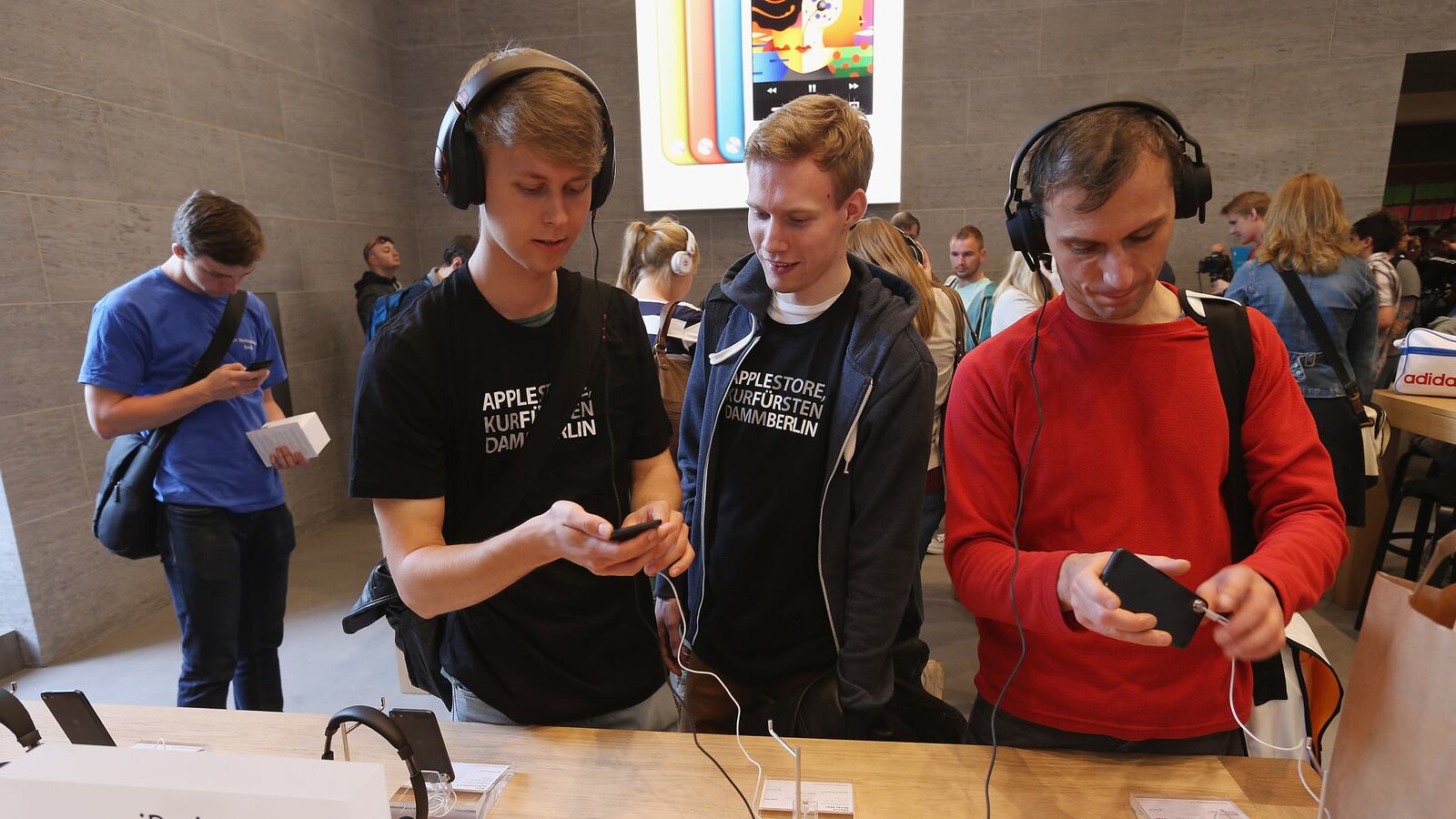In 1997, when I was a college senior living in New England, I wanted to hear The Stooges, the iconic 1967 debut album by Iggy and the Stooges. This wasn’t easy.

The record store in town didn’t have a copy. Neither did my college’s radio station, the library, or any of my friends. To get the record, I had to (1) find a phone book; (2) call a bunch of record stores in Connecticut—shops with limited shelf space that might be taken up by Barbra Streisand, the Grateful Dead, or N.W.A; (3) hope that one of these stores had a copy of a CD reissue of a then relatively obscure proto-punk LP; (4) get directions from a clerk who might or might not be under the influence of marijuana; (5) have a car or access to one; (6) fill that car with gas; (7) find a map; (8) drive 40 minutes from my room to the store; (9) hope no one would buy the store’s only copy before I could get there; and (10) drive 40 minutes back. At least I had a portable CD player, and could listen to the record during the return trip.
That all changed 10 years ago on April 28, when Apple’s iTunes Music Store opened its virtual doors and a ritual familiar to any music lover over 30—hunting down hard to find songs—became as arcane as Neanderthals banging rocks together to make fire. Using Steve Jobs’s sleek platform, I can download The Stooges for $7.99 to an iPhone on a city bus. If I’m tired of that record, I can buy one of iTunes’s other 26 million songs, not to mention its more than 700,000 apps, 190,000 TV episodes, and 45,000 films. It’s not just a universe of entertainment that’s at my fingertips in the virtual iTunes store—it’s the universe of entertainment.
It’s expensive for music to be so cheap. Apple’s generic shop, which has captured more than 60 percent of the U.S. digital-music market and sells one out of four songs in America, physical or digital, makes the most valuable company in history the broker between artists and audiences. It strips music buying of serendipity and context, making Justin Bieber as important as the Beatles. It divorces singles from the albums on which they appear. It hurts record labels and makes it less vital for musicians to make personal connections with fans and sell records on the road. It allows shuffling to replace DJs. And the iTunes story makes music—arguably the most mysterious, magical art form—as accessible and ubiquitous as skim milk.
I have a dog in this fight. I began playing rock music at 14. By 20, I’d released my first 7-inch single. In the 16 years since, I've released more than 20 of my own or other artists’ singles or full-length records in a variety of formats: 7-inch and 12-inch records, full-length LPs, CDs, and even cassettes.
Before iTunes, the market for these pieces of plastic now destined for landfills was large enough for an also-ran punk musician like me to make a little money. A CD manufactured for about $2 could be sold for $10. That's a profit margin an airline would kill for. If a good band worked hard, recorded on the cheap and played for enough people to sell 5,000 CDs—modest by pre-iTunes standards—that group would earn about $40,000 to split with its record label or, if it had no label, to spend on rent, food, gear, or bad habits. Even in Marion Barry’s Washington, D.C., this was never enough to live on, but it beat lawyering.
I play music because it can foster a community that’s regional, not virtual. Even before iTunes, the geographic concentration of artistic energy in hipster magnets like Brooklyn made it difficult to keep smaller music scenes in, say, Washington, D.C.; Chapel Hill, North Carolina; and Bloomington, Indiana, vibrant. Sure, New Orleans's Quintron and Ms. Pussycat or Baltimore's Celebration might be cooler than a bunch of bands from New York that sort of sound like Interpol, but a one-stop Web shop didn't play to the strengths of the always-struggling independent music business: tight-knit communities, face-to-face relationships, and local character.
To my great dismay, iTunes pissed on such values and Brooklynized the music world—for musicians and listeners alike—while the world cheered. A store less about music than peddling the ever-obsolete devices required to hear it dispensed with the do-it-yourself ethos as my peers shrugged. Was everyone so sick of their record collections and the communities they built?
Even though people buy more music than ever before, recording-industry revenues have been cut in half since iTunes debuted. (This isn’t just because of iTunes. There’s no shortage of places such as Spotify and YouTube to hear music for free, legally, on the Internet—and of course many more that provide it illegally) Some, including the less-than-fair-and-balanced publication MacDailyNews, say this is fair, that record-industry fat needed to be trimmed. Why should someone pay $9.99 for, say, the underwhelming Led Zeppelin III just to hear “Immigrant Song?”
Only because “Immigrant Song” is part of a larger whole, even if that whole is mediocre; because Led Zeppelin III, released in 1970, is part of a landmark band’s progression from Led Zeppelin I to Led Zeppelin IV; because the record’s art, which can’t be appreciated in miniature .gifs appropriately called “thumbnails,” is bizarre, and worth scrutinizing; because hearing “Immigrant Song” without reference to lesser songs like “Gallows Pole” or “That’s the Way” is like reading Matthew without reading Mark, Luke, or John; and because those who come to Led Zeppelin III on its own terms rather than on Steve Jobs’s find rewards that iTunes renders invisible.
Today, Led Zeppelin III, and, for that matter, John Coltrane’s A Love Supreme, the Beastie Boys’ License to Ill, and all of my records populate databases. Worse: like trends in the Dow Jones industrial average or the number of coconut waters sold by Whole Foods, they are data.
Some see democracy in this business model. Though statistics are difficult to pin down, I think it’s safe to say that listeners can buy more music now than ever before. Whether its uncurated sonic offerings suck or not, iTunes—and smaller sites like Bandcamp—makes it easy to sell songs. There’s no scarcity of next big things produced in isolation with no regard for an audience. One can write, record, and distribute songs invisibly from one’s bedroom without ever speaking to another human being. Listeners, alone in their bedrooms, can listen invisibly, too.
I prefer selling music to bartenders. Selling a record to a person at a show—a practice that’s dying—is always satisfying, but selling one to a bartender is special. These poor souls are assaulted by mostly terrible music every time they go to work. When bartenders buy albums, they aren’t just being nice. My records, I hope, are still part of some bartenders’ collections—maybe next to records by artists I admire like Lou Reed, PJ Harvey, and Ol’ Dirty Bastard. These records can’t be ignored—left un-downloaded or un-clicked on. If you don’t like them, you have to throw them away. I like that.
Great technological leaps forward—the cotton gin, electricity, the telegraph, the automobile, the telephone, e-mail—call out Cassandras among us. In his 2012 book How Music Works, David Byrne highlights the ridiculous skepticism that met recorded music not long after its invention:
“John Philip Sousa, the march king, was opposed to recorded music. He saw the new music machines as a substitute for human beings. In a 1906 essay entitled ‘The Menace of Mechanical Music,’ he wrote, ‘I foresee a marked deterioration in American music and musical taste...in this twentieth century come these talking and playing machines that offer to reduce the expression of music to a mathematical system of megaphones, wheels, cogs, discs, cylinders and all manner of revolving things.’ God save us from revolving things!”
Apple’s iTunes Music Store is not devastating. Sure, few understand how it works. Sure, few care how it pays artists. Sure, few listeners hear what they’re missing. Sure, the culture fostered by physical records and those who bought them will die. But other communities, probably online, will thrive in spite or because of one popular—for now —way to buy music.
Still, iTunes brings me down. It’s a cliché and a bummer, but I can't help it: I am a Cassandra.




